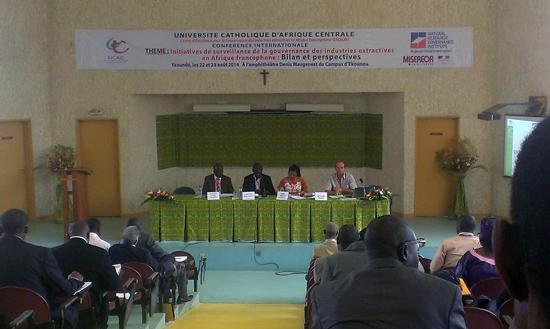
Stakeholders Converge in Cameroon: Mining Governance and Oversight the Topic du Jour at Francophone African Conference
Recently the Natural Resource Governance Institute (NRGI) and the Catholic University of Central Africa (UCAC) held a two-day conference in Yaoundé, Cameroon, on governance and oversight of the extractive industries. The event brought together civil society organizations, parliamentarians, journalists, researchers, public officials, practitioners, and private sector representatives from eleven countries in francophone Africa to share insights from their work.
Civil society engagement in the region's extractive industries is a relatively recent phenomenon, as it has long been considered political and highly sensitive, in addition to being complex and technical. Civil society organizations (CSOs) joined the conversation on extractives ahead of the 2002 launch of the Extractive Industries Transparency Initiative (EITI) and the Conference of Bishops of Central Africa (ACERAC) statement on the paradox of plenty, calling on justice and peace commissions to monitor oil operations in the region. They also joined the debate on the ambitious yet controversial Chad-Cameroon pipeline project the following year.

Panelists share experiences with monitoring tools to improve transparency and accountability in francophone Africa.
It has now been more than a decade since CSOs in francophone Africa began advocating for the fair sharing of revenues from extractives and monitoring social and environmental impacts. What have CSOs achieved in that time? What lessons can we take from their various experiences? What are the most salient issues of the day?
At last week's conference, oversight actors in the extractives sectors gathered to answer such questions, analyze and improve their work, and share approaches going forward. The very first of its kind, the international meeting took place in the middle of a two-week course on resource governance run by the francophone Africa extractive industries knowledge hub (Le Centre d'Excellence pour la Gouvernance des Industries Extractives en Afrique Francophone, or CEGIEAF). It also showcased a rich and diverse set of presentations and lively debates on key topics.
For example, speakers discussed what role regional bodies—namely the Economic Community of West African States (ECOWAS) and the Economic Community of Central African States (Communauté Économique des États de l'Afrique Centrale, or CEMAC)—have played in resource governance. Participants noted that while in ECOWAS there has been a coordinated, participative process to design mining directives, the CEMAC sub-region has lagged behind in providing a platform for civil society to contribute to the agenda. As one activist noted, when Barack Obama met African heads of state at the White House, U.S. vice president Joe Biden and secretary of state John Kerry met with African civil society representatives, yet politicians in Africa rarely engage civil society on their own turf. Participants also noted that in both ECOWAS and CEMAC, ownership of regional initiatives by member states is weak.
Another important discussion focused on challenges in resource transparency in a range of contexts, including national oil companies, such as Cameroon's SNH, and the political sensitivities in Niger`s renegotiation of its AREVA uranium contracts. On the key question of contract transparency, two legal experts discussed why governments shouldn't fear legal retribution from companies for divulging their resource contracts, citing the Democratic Republic of the Congo (DRC) as an example. Participants concluded that credibility, professionalism and networking were the keys to civil society achievement.
In that spirit, participants identified areas in which they felt oversight actors should play a stronger role—contract analysis, revenue management, data quality, and monitoring tax and financial leakages—through networks and coalitions. Many felt that journalists and parliamentarians alike have a long way to go, though Cameroon, DRC, Niger, and Burkina Faso already have parliamentary natural resource committees. And many praised the EITI multi-stakeholder groups and the Publish What You Pay (PWYP) platforms. (Francophone Africa now has ten EITI-compliant and two EITI candidate countries, demonstrating very strong commitment to the process throughout the region.)
For the organizations that have moved beyond simple denunciation to research-based constructive criticism, the effect is tangible. Chad, Guinea and Niger have adopted transparency, accountability and anti-corruption legal requirements. DRC and Guinea have published mining contracts. And communities affected by the Chad-Cameroon pipeline project have been compensated. Lastly, the suspension of a major Chinese oil company's operations in Chad for environmental violations was cited as a particular success.
As stakeholders observed at the Yaoundé conference, interest in resource governance has grown. So too has the need for improved cooperation among those dedicated to bringing change.
The conference in Yaoundé was held with the generous support of MISEREOR, Agence Universitaire de la Francophonie (AUF) and French Cooperation. This is the second of two posts on the conference. Read the first post here.
David Mihalyi is an economic analyst at NRGI. Evelyne Tsague is NRGI's francophone Africa regional coordinator.
Authors


Evelyne Tsagué
Africa Capacity Development Advisor